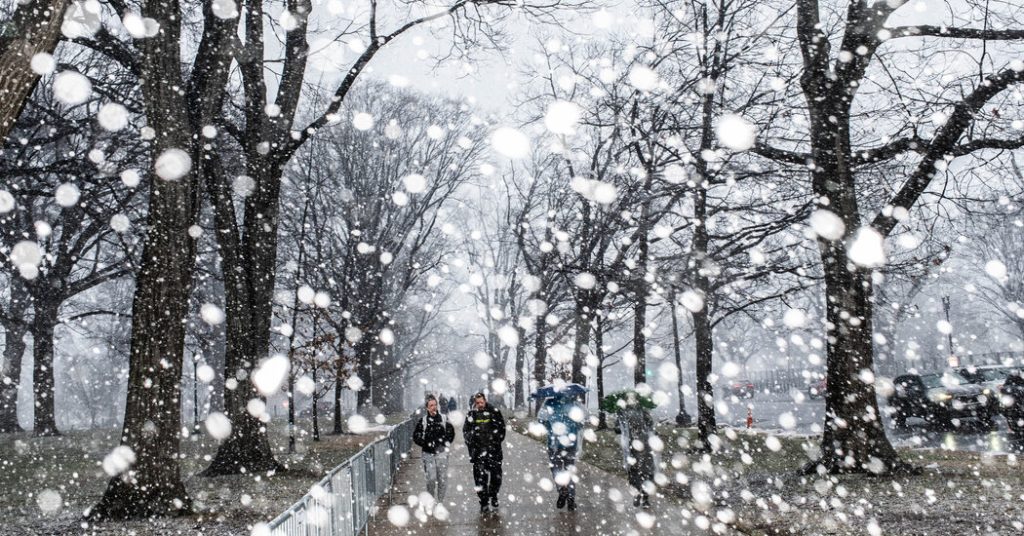The recent winter weather has descended upon much of the United States with an unyielding grip, bringing a relentless assault of frigid temperatures and heavy snowfall that has disrupted daily life and challenged the resilience of communities from coast to coast. This pervasive cold snap has plunged temperatures far below the seasonal norms for January, creating potentially hazardous conditions, particularly when exacerbated by strong winds. The foreseeable future offers little respite, as forecasts predict the continuation of this bitter blast for at least the next week, leaving millions bracing for prolonged exposure to the elements. This widespread cold wave is not merely an inconvenience; it poses real dangers, particularly for vulnerable populations, and underscores the need for preparedness and community support in the face of extreme weather events.
Adding to the woes of the already frigid temperatures, significant snowfall has blanketed parts of the Mid-Atlantic and Northeast regions. The weekend’s snowstorm dumped some of the largest accumulations of the season, with certain areas of West Virginia measuring up to 16 inches of snow. This heavy snowfall has led to travel disruptions, power outages, and the arduous task of digging out from under the weighty white blanket. The combination of extreme cold and heavy snow creates a particularly challenging situation, requiring extra vigilance and preparedness. The impact of these conditions is felt not only in the immediate aftermath of the storm but also in the days that follow, as communities grapple with the ongoing effects of snow removal, transportation challenges, and the potential for further weather-related disruptions.
As if the existing conditions weren’t challenging enough, a rare winter storm is poised to threaten the Gulf Coast states and the Southeast starting Monday night. This unusual event has the potential to bring up to 10 inches of snow accumulation to areas unaccustomed to such wintry precipitation. This poses a unique set of challenges, as these regions typically lack the infrastructure and preparedness strategies for dealing with significant snowfall. The impending storm raises concerns about power outages, transportation disruptions, and the safety of residents who may be unfamiliar with navigating icy conditions. The unusual nature of this event underscores the unpredictable nature of winter weather and the importance of adaptability in preparing for and responding to such events.
Despite the bleak forecast and the imposing weather conditions, the holiday weekend saw many Americans venturing out, undeterred by the cold and snow. This resilience and determination to carry on with holiday plans, even in the face of adversity, is a testament to the human spirit. However, it also highlights the need for caution and preparedness when venturing out in such challenging conditions. While the desire to celebrate and connect with loved ones is understandable, it’s crucial to prioritize safety and take necessary precautions to mitigate the risks associated with extreme weather. This includes dressing warmly in layers, avoiding unnecessary travel, and staying informed about weather updates and potential hazards.
Across the country, scenes unfolded of individuals and communities grappling with the challenges posed by the winter weather. From shoveling snow-covered driveways and sidewalks to navigating icy roads and braving the biting wind, Americans demonstrated a collective effort to cope with the conditions. These scenes paint a picture of resilience and community spirit in the face of adversity. Neighbors helping neighbors, essential workers braving the elements to provide critical services, and families finding ways to enjoy the holiday season despite the challenging circumstances – these are all testaments to the ability of communities to come together during difficult times.
The widespread impact of this winter weather event serves as a reminder of the power of nature and the importance of preparedness. From the Northeast grappling with heavy snowfall to the Southeast facing the prospect of a rare winter storm, communities across the country are being tested. This shared experience underscores the need for robust infrastructure, effective emergency response systems, and a collective commitment to community support. Furthermore, it highlights the importance of individual preparedness, including staying informed about weather conditions, stocking up on essential supplies, and having a plan in place in case of power outages or other emergencies. As the nation continues to navigate this challenging winter season, the lessons learned and the resilience demonstrated will undoubtedly serve as valuable tools for future preparedness efforts.


